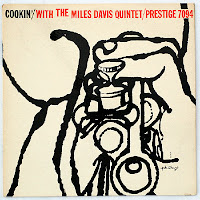Note: due to objections from the music industry, the music samples have been removed.
I have been listening my way through the 41 tracks on Charlie Mingus' Passions of a Man. I am thinking that is not only the definitive Mingus collection, but one of the great treasures of modern jazz. Mingus clearly had that genius that most distinguishes jazz: the ability to dig deeply into the veins of various musical traditions, pull out the ore, and melt and mix it into jewels worthy of any crown. I also suspect that Mingus rates as the second greatest small group leader, surpassed only by Miles Davis. So what if he was nuts?
Another reason this collection is priceless is that it includes so many great jazz masters. I have almost everything Eric Dolphy recorded under his own name. Now I have more Dolphy. Good. In addition, there is Jackie McLean, Pepper Adams, Mal Waldron, Horace Parlan, and Bud Powell.
Passions of a Man includes
- Pithecanthropus Erectus,
- The Clown,
- Blues and Roots,
- Mingus at Antibes,
- Oh Yeah, and
- Tonight at Noon.
All of them are good, but numbers 1 and 4 are worth their weight in gold. Mingus at Antibes is one of the finest live jazz recordings. Ted Curson (tp) Eric Dolphy (as, bcl) Booker Ervin (ts -1/4,6) Bud Powell (p -6) Charles Mingus (b, p -1/5, b -6) Dannie Richmond (d). Here is a sample:
Prayer for Passive Resistance
And on the recording Oh Yeah, there is Booker Ervin and Roland Kirk. I have pushed Booker Ervin pretty hard on this blog. I think he is one of the most under-appreciated geniuses in the business. Roland Kirk is better appreciated, but I have pushed him as well. Also on the album are Jimmy Knepper on trombone, Doug Watkins on bass, and Dannie Richmond on drums. Here is a sample:
Hog Calling Blues
This is a long post, but I am not out of steam yet. A second box set of Mingus available is The Complete 1959 Columbia Recordings. This is a three disc set with Mingus' magnum opus, Mingus Ah Um, Mingus Dynasty, and a third disc with alternative takes from the first two. If you don't have the first two, this is a reasonable purchase from eMusic (28 credits). If you do have them, you can always download the third disc.
Mingus Ah Um is one of the core recordings in any good jazz library. Mingus Dynasty is almost as toe-curling good. The band: Richard Williams (tp) Jimmy Knepper (tb) Jerome Richardson (fl, bars) John Handy (as) Booker Ervin, Benny Golson (ts) Teddy Charles (vib -1/5) Roland Hanna (p -1/5) Nico Bunick (p -6) Charles Mingus (b) Dannie Richmond (d, timp). Booker Ervin again, and Roland Hanna! Here is one last delicious sample:
Censored
Well, that's a pretty good bunch of Mingus. I can't resist mentioning another album available from eMusic. The Town Hall Concert (1964) consists of two very long, very fine recordings. eMusic has it for, well, two credits. More Eric Dolphy. More brilliant jazz.
Okay, that's enough work for one Friday night. Here in the Dakotas, ice and snow are coming in. Mingus is keeping me warm. If you like what I am doing, drop me a line.

![The Complete Nat Hentoff Sessions (with Archie Shepp) [Bonus Track Version] album cover](http://images.emusic.com/music/images/album/133/610/13361069/600x600.jpg)




